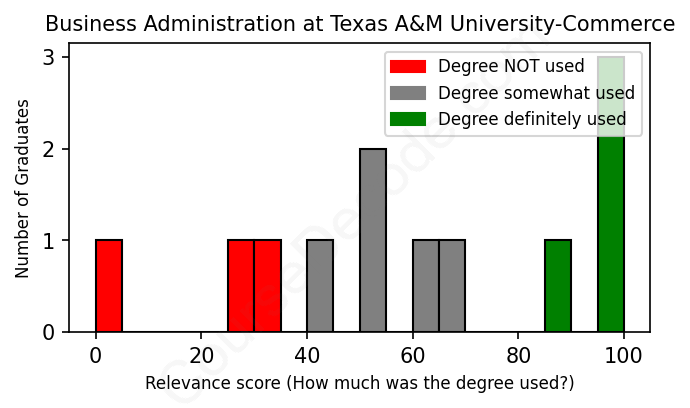
First, some facts. Of the Business Administration graduates from Texas A&M University-Commerce we've analyzed , here's how many have used (or NOT used) their degree in their career:

These are estimates based on AI analysis of 12 LinkedIn profiles (see below).
The verdict? Below average. Overall, with an average relevance score of 59%, Business Administration graduates from Texas A&M University-Commerce have a lower likelihood (-8%) of finding work in this field compared to the average graduate across all fields:
And for comparison, here's the chart for all profiles we've looked at across all degrees.
Also, after graduating, only 25% of these graduates have pursued further education other than another Bachelor's degree (such as a Masters degree or other), compared to the average across all profiles of 35%. This suggests a Bachelors degree is enough for most Business Administration graduates, and it's normal to look for work straight after graduation.
See the details:
|
Relevance score: 64% We think this person has gone into a career only somewhat relevant to their degree. We think this person has gone into a career only somewhat relevant to their degree.
DEGREE INFOGraduated in 2022 from Texas A&M University-Commerce with a Bachelor's degree in Business Administration. No other secondary education since. JOB HISTORY SINCE GRADUATIONInstitutional Associate Charles Schwab Nov 2022 - Feb 2024 Financial Analyst  Raytheon Feb 2024 - Present ABOUTNo information provided. |
The top 10 most common jobs done by the graduates we've analyzed (ranked most common to least) are:
After looking through the LinkedIn profiles of graduates from Texas A&M University-Commerce with a degree in Business Administration, it seems like the most common jobs these individuals have landed are in auditing, management, sales, and marketing roles. Specifically, many have taken positions as Senior Auditors, where financial analysis is a crucial part of the job—this aligns well with what they learned in their Business Administration courses. There are also several management positions in various sectors, such as healthcare and event planning, that require skills like organization and strategic thinking, which are definitely linked to their educational background. Meanwhile, some have transitioned into roles like Brand Promoter or Sales Consultant, which, while they require some business acumen, don't rely heavily on the foundational principles of business administration on a daily basis.
Overall, many of the roles seem to have a fair amount of relevance to Business Administration, particularly in areas like finance and management. However, there are a good number of positions in teaching, administrative tasks, or other fields that don’t directly leverage their degree in a significant way. This shows a mix of graduates using their skills directly related to business management, while others veer off into roles that, although they may involve some business elements, do not fully utilize the core concepts taught in their programs. So, if you’re thinking about what kind of jobs you might get with a Business Administration degree, the options are pretty varied—some will closely align with your studies, while others might just give you a taste of business without diving deep into it.
Here is a visual representation of the most common words in job titles for Business Administration graduates (this is across all Business Administration graduates we've analyzed, not just those who went to Texas A&M University-Commerce):

From the LinkedIn profiles of graduates from Texas A&M University-Commerce with degrees in Business Administration, it's clear that many individuals have followed successful career trajectories that relate closely to their studies. Right after graduation, a lot of these grads seem to land positions in operational roles, such as management trainees, administrative roles, or even entry-level auditing. For example, graduates from 2011 and 2012 quickly jumped into audit and marketing roles, which show a strong connection to their business backgrounds. Over time, many of them have climbed the ladder into more advanced positions, like Chief Operating Officer and Director of Institutional Effectiveness, indicating that they're leveraging their education effectively and moving up in the corporate world.
Looking at their careers five to ten years down the line, most graduates seem to be achieving significant roles within well-established companies. Whether it's in healthcare, education, engineering, or event management, many have found their niche in industries that benefit from a solid understanding of business principles. Some, like the graduates over the past few years, have even started their businesses or moved into creative roles, showcasing versatility in their career paths. Overall, while there are a few outliers who have strayed from traditional business roles, the majority appear to be doing quite well in positions that align with their degrees, reinforcing the value of a Business Administration education from Texas A&M University-Commerce.
So, here's the deal: pursuing a Bachelor’s degree in Business Administration at Texas A&M University-Commerce isn't a walk in the park, but it's not the most brutal experience either. It’s pretty much on par with most other business programs out there—there are definitely some challenging classes, especially when you get into stuff like finance or accounting, but you’ll also find easier ones that balance it out. If you're organized, manage your time well, and stay on top of assignments, you’ll probably find it manageable. Just keep in mind that like any degree, it will require commitment and effort, so be ready to hit the books and participate in group projects!
Most commonly, in the LinkedIn profiles we've looked at, it takes people 2 years to finish a Bachelor degree in Business Administration.
So, looking at the job paths of these Texas A&M University-Commerce graduates, it seems like a mixed bag in terms of money. The senior auditor roles and director positions likely pay pretty well, especially with years of experience, suggesting those grads might be making decent salaries. On the flip side, we’ve got some folks in education and entry-level roles, where pay can be lower. The real estate agent and marketing director positions might be more lucrative, depending on commission and performance. Overall, it appears that some have climbed the financial ladder while others are still figuring things out, but continuing education and job growth could help boost their earnings down the line!
Here is a visual representation of the most common words seen in the "about" section of LinkedIn profiles who have a Bachelor degree in Business Administration (this is across all Business Administration graduates we've analyzed, not just those who went to Texas A&M University-Commerce). This may or may not be useful:

Here are all colleges offering a Bachelor degree in Business Administration (ordered by the average relevance score of their Business Administration graduates, best to worst) where we have analyzed at least 10 of their graduates: